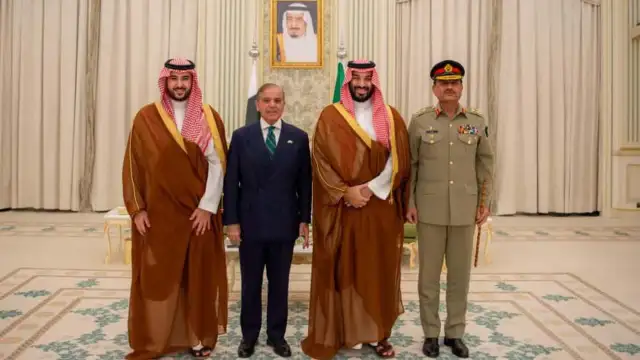On September 17, 2025, Pakistan and Saudi Arabia formalized a defence agreement under which any aggression against one country will be treated as an aggression against both. The Strategic Mutual Defence Agreement was signed during Pakistan Prime Minister Shehbaz Sharif’s state visit to Riyadh, where he met Crown Prince and Prime Minister Mohammed bin Salman at Al-Yamamah Palace.

Strengthening a Historic Partnership
The pact builds on nearly eight decades of strong bilateral ties, grounded in Islamic solidarity, shared strategic interests, and mutual trust. A joint statement noted that the agreement reflects the two countries’ commitment to enhance security cooperation, strengthen joint deterrence, and contribute to regional and global peace.
Key Provisions of the Agreement
The agreement explicitly states that any attack on either Pakistan or Saudi Arabia will be considered an attack on both, reinforcing the nations’ collective defence posture. It also aims to deepen defence collaboration and develop coordinated strategies for deterrence against external threats.
Leadership and Delegation
PM Sharif was welcomed by Riyadh Deputy Governor Muhammad bin Abdulrahman bin Abdulaziz and accompanied by key ministers including Foreign Minister Ishaq Dar, Defence Minister Khawaja Asif, Finance Minister Muhammad Aurangzeb, Information Minister Attaullah Tarar, Environment Minister Musadik Malik, and Special Assistant Tariq Fatemi.
Regional Context and Previous Visits
This visit marked Sharif’s third trip to the Gulf within a week. He had previously visited Qatar twice to show solidarity following Israel’s attack on Hamas leadership and to attend an emergency meeting of Arab-Islamic nations on the crisis.
India’s Response
The Indian Ministry of External Affairs stated it would examine the impact of the agreement on national security and regional stability. The MEA acknowledged that the pact formalizes a long-standing arrangement between Pakistan and Saudi Arabia and reiterated India’s commitment to safeguarding its national interests and ensuring comprehensive security.
